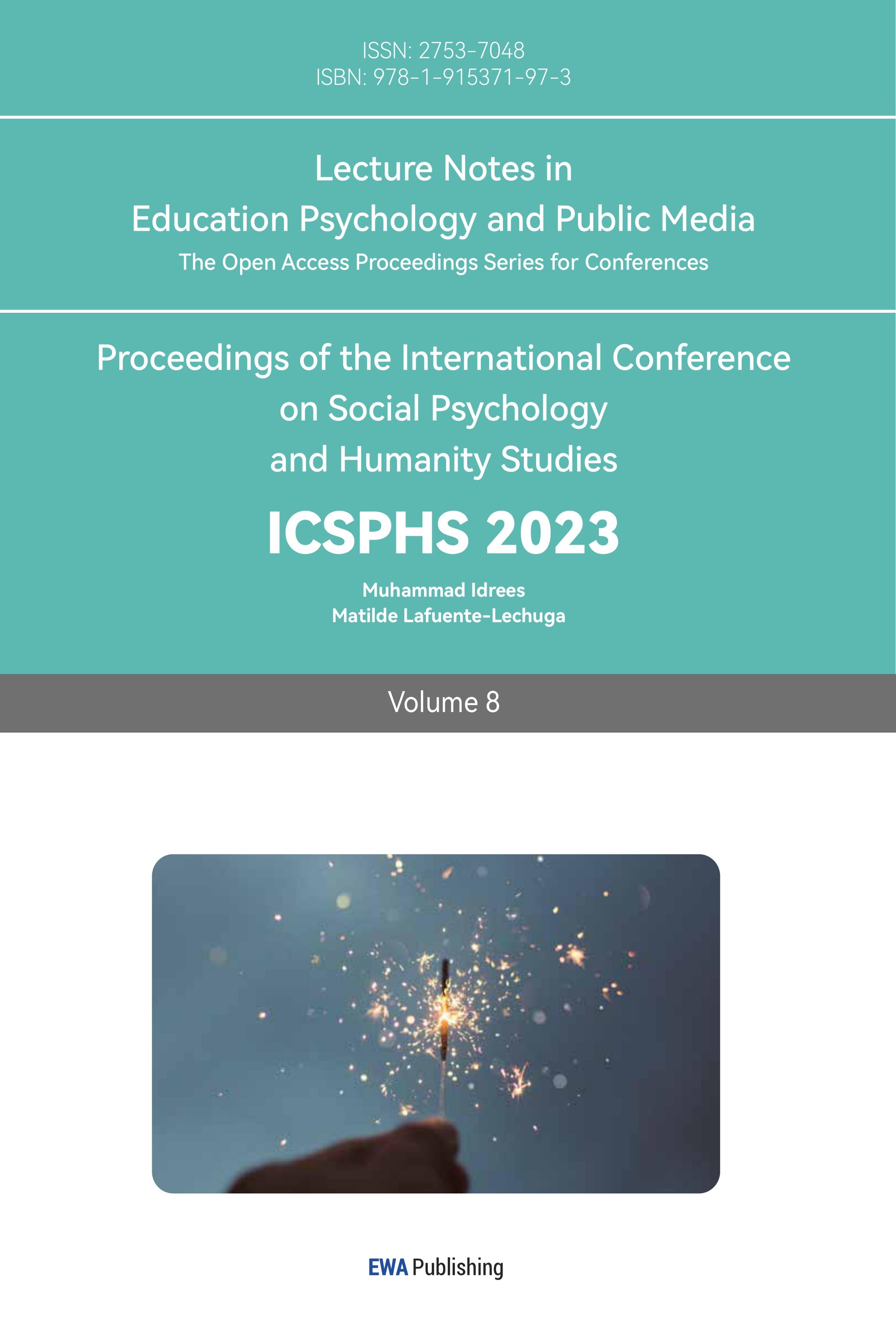References
[1]. Robert Keohane, Joseph Nye: Power and Interdependence. Beijing: Peking University Press, 2005.
[2]. Xu Zhou, Zhao Yujia. Pillars and downside risks of China-South Korea relations. International Political Science, 2022, 7(04):151-158.
[3]. Han Xiandong, Zhao Shaoyang. South Korea's strategy toward China in the context of Sino-US strategic competition: an analysis based on the hedging conceptual framework. International Forum, 2021, 23(03):97-118+158-159.
[4]. Zhang Chi. South Korea's Perceptions and Responses of the U.S.-China Strategic Game, and the Direction of Sino-Korean Relations. International Studies, 2022, (03):64-81+124-125.
[5]. Taeho Kim. Sino-ROK Relations at a Crossroads: Looming Tensions amid Growing Interdependence. The Korean Journal of Defense Analysis, KJDA, 2005, 17(1).
[6]. Jung, HJ and Jeong, HW. South Korean Attitude towards China: Threat Perception, Economic Interest, and National Identity. AFRICAN AND ASIAN STUDIES, 2016, 54(04):707-730.
[7]. Tae-am, O. Security Challenges and Policy Dilemmas of South Korea in 2012[J]. KOREAN JOURNAL OF DEFENSE ANALYSIS, 2012, 24(01):17-32.
[8]. Wirth, C. 'Power' and 'stability' in the China-Japan-South Korea regional security complex. PACIFIC REVIEW, 2015, 28(04):553-575.
[9]. Kim, GO. Building a Peaceful East Asian Community: Origins of a Regional Concept and Visions for a Global Age. ASIAN PERSPECTIVE, 2013, 37(02):233-254.
[10]. Heeok Lee. China's Policy toward (South) Korea: Objectives of and Obstacles to the Strategic Partnership. The Korean Journal of Defense Analysis, KJDA, 2010, 22(3).
Cite this article
Liu,X.;Xiao,R. (2023). Exploring the Relationship Between China and South Korea from the Theory of Complex Interdependence: A Case Study of China-ROK Visa Suspension. Lecture Notes in Education Psychology and Public Media,8,321-326.
Data availability
The datasets used and/or analyzed during the current study will be available from the authors upon reasonable request.
Disclaimer/Publisher's Note
The statements, opinions and data contained in all publications are solely those of the individual author(s) and contributor(s) and not of EWA Publishing and/or the editor(s). EWA Publishing and/or the editor(s) disclaim responsibility for any injury to people or property resulting from any ideas, methods, instructions or products referred to in the content.
About volume
Volume title: Proceedings of the International Conference on Social Psychology and Humanity Studies
© 2024 by the author(s). Licensee EWA Publishing, Oxford, UK. This article is an open access article distributed under the terms and
conditions of the Creative Commons Attribution (CC BY) license. Authors who
publish this series agree to the following terms:
1. Authors retain copyright and grant the series right of first publication with the work simultaneously licensed under a Creative Commons
Attribution License that allows others to share the work with an acknowledgment of the work's authorship and initial publication in this
series.
2. Authors are able to enter into separate, additional contractual arrangements for the non-exclusive distribution of the series's published
version of the work (e.g., post it to an institutional repository or publish it in a book), with an acknowledgment of its initial
publication in this series.
3. Authors are permitted and encouraged to post their work online (e.g., in institutional repositories or on their website) prior to and
during the submission process, as it can lead to productive exchanges, as well as earlier and greater citation of published work (See
Open access policy for details).
References
[1]. Robert Keohane, Joseph Nye: Power and Interdependence. Beijing: Peking University Press, 2005.
[2]. Xu Zhou, Zhao Yujia. Pillars and downside risks of China-South Korea relations. International Political Science, 2022, 7(04):151-158.
[3]. Han Xiandong, Zhao Shaoyang. South Korea's strategy toward China in the context of Sino-US strategic competition: an analysis based on the hedging conceptual framework. International Forum, 2021, 23(03):97-118+158-159.
[4]. Zhang Chi. South Korea's Perceptions and Responses of the U.S.-China Strategic Game, and the Direction of Sino-Korean Relations. International Studies, 2022, (03):64-81+124-125.
[5]. Taeho Kim. Sino-ROK Relations at a Crossroads: Looming Tensions amid Growing Interdependence. The Korean Journal of Defense Analysis, KJDA, 2005, 17(1).
[6]. Jung, HJ and Jeong, HW. South Korean Attitude towards China: Threat Perception, Economic Interest, and National Identity. AFRICAN AND ASIAN STUDIES, 2016, 54(04):707-730.
[7]. Tae-am, O. Security Challenges and Policy Dilemmas of South Korea in 2012[J]. KOREAN JOURNAL OF DEFENSE ANALYSIS, 2012, 24(01):17-32.
[8]. Wirth, C. 'Power' and 'stability' in the China-Japan-South Korea regional security complex. PACIFIC REVIEW, 2015, 28(04):553-575.
[9]. Kim, GO. Building a Peaceful East Asian Community: Origins of a Regional Concept and Visions for a Global Age. ASIAN PERSPECTIVE, 2013, 37(02):233-254.
[10]. Heeok Lee. China's Policy toward (South) Korea: Objectives of and Obstacles to the Strategic Partnership. The Korean Journal of Defense Analysis, KJDA, 2010, 22(3).









